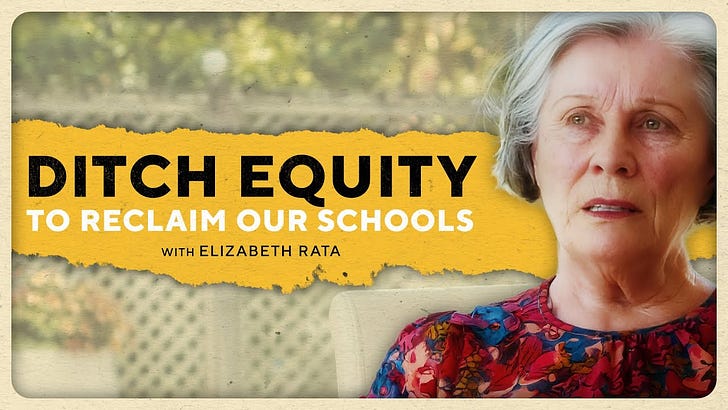While in New Zealand, I had the privilege of sitting down with Elizabeth Rata, a sociologist of education at the University of Auckland. Elizabeth is the Director of the Knowledge in Education Research Unit (KERU), within the School of Critical Studies at the Faculty of Education and Social Work—and she is based! Her research includes knowledge in the curriculum, knowledge politics, ethnic revivalism, Māori education, research methods, and the history of New Zealand education.
Our conversation centered on education, which, according to Elizabeth, has moved away from its original purpose of being truth-centered and providing quality opportunities for students. Instead, it has become equity (adjusting shares, equal outcomes) based. This has been an unmitigated catastrophe. It has undermined the curriculum's foundational goals and done a profound disservice to students. Over the past 40 years, the focus on equity has led to a dramatic reduction in the quality of education.
One of Elizabeth’s key deliverables was the importance of a curriculum rooted in the development of thinking skills. The best academic foundation encourages students to engage with ideas, giving them the skills to think critically by challenging their beliefs and cultural narratives. A successful curriculum should strike a balance between intellectual challenge and the freedom to succeed or fail.
We also explored the concept of a knowledge-rich curriculum. Elizabeth advocates for direct instruction (FWIW, I do as well) that prioritizes both content and the concepts underlying that content. By teaching both, students can meaningfully apply what they learn in real-world contexts. In contrast, relying solely on students’ self-generated experiences and “knowledge constructions”—constructivism—leaves massive gaps in their knowledge and critical thinking abilities—if they even have any knowledge at all.
Elizabeth also introduced the concept of partial loyalty—the idea that individuals can be part of a society while still critically engaging with it in ways that are constructive, rather than destructive. She emphasized the importance of controlling emotional responses, maintaining a strong work ethic, and continuously seeking truth. While obvious, when integrated into the education system these values could catalyze a rethinking of how we approach learning and knowledge acquisition.
Ultimately, Elizabeth left me with a renewed sense of purpose regarding the potential for education to be reimagined. If we can return to a curriculum focused on the development of critical thinking, balanced with content knowledge, moral engagement with society, and Truth as its North Star, we may be able to help fix what has been broken over the last decade.



I loved your introduction to the interview with Elzabeth Rata and am looking forward to viewing the program.
In over five decades of involvement with higher learning, I’ve come to appreciate the importance of balance. Learning “what’s so?” (the bailiwick of science) and “so what?” (inviting commentary from a plethora of perspectives and traditions) are both essential. However, it seems to me that answering the first question, is a prerequisite for engaging the second, more cosmic and complicated, one. The rush to righteousness of extreme progressives often ignores the first question altogether and attacks those who suggest that contributions to conversations about the second question be supported by evidence as well as reason.
Having been dismissed for cause by Berea College through an administrative process that was far less than i was due and having two able lawyers take my case on a contingency basis, federal court fees have exceeded $65k and the process has taken over 7 years and is still undecided. However, recently, the 6th federal circuit partially reversed a district judge’s previous summary judgment in favor of the college.
Professor-v.-Professor Defamation Suit Can Go Forward, Based on Defendant's Statements to Students
In the Cancelling of the American Mind, Lukianoff & Schlott suggest that the 200 recent Woke-related dismissals reflect a rate about twice as high as the infamous McCarthy purge of “communists” in the 1950’s. Nick Wolfinger has collected a score of these narratives in an anthology to be published soon. My story will be among them.
Thank you for keeping this critical conversation alive.
Here is a note I wrote to Elizabeth after listening (twice!) to her conversation with Pete:
Dear Elizabeth:
I listened to your conversation with Pete Boghossian and it was a breath of fresh air.
I am a retiree and I returned to university a year ago as a student (focusing on history and philosophy). Previously, I earned an undergraduate degree in the early 80s (business school) and then a law degree. The world of academia today seems, in many respects, unrecognizable relative to what I experienced when I was a student years ago.
I recently read a provocative 2022 essay from Quillette entitled “Sex and the Academy”by Cory Clark and Bo Winegard. The essential thesis is there are average sex differences (a bimodal distribution curve), rooted in part in evolutionary biology, which are manifested in different objectives between male and female academics. For example, females relative to males tend to value concerns for student emotional wellbeing over an open conflict of ideas. These differences may be at the root of many of the changes we are seeing in academia as academia becomes more feminized (for example, there are now about 20,000 more PhDs awarded to females than to males each year in the USA). It is a good thing females now have equal access to academia but this has led to changes in much of the character of academia (many of which are features you criticize).
I’m wondering if you have looked at academia from this perspective?
Thank you for taking the time to talk with Pete. I’ve listened to your conversation with him twice!
Loren